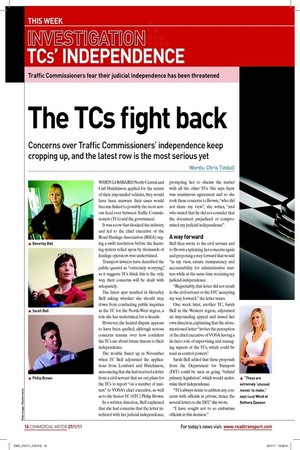The TCs fight back
Page 16

Page 17

If you've noticed an error in this article please click here to report it so we can fix it.
Concerns over Traffic Commissioners’ independence keep cropping up, and the Latest row is the most serious yet
WHEN LOMBARD North Central and Carl Hutchinson applied for the return of their impounded vehicles, they would have been unaware their cases would become linked to possibly the most serious feud ever between Trafic Commissioners (TCs) and the government.
It was a row that shocked the industry and led to the chief executive of the Road Haulage Association (RHA) urging a swift resolution before the licensing system relied upon by thousands of haulage operators was undermined.
Transport lawyers have described the public quarrel as “extremely worrying”, as it suggests TCs think this is the only way their concerns will be dealt with adequately.
The latest spat resulted in Beverley Bell asking whether she should step down from conducting public inquiries as the TC for the North-West region, a role she has undertaken for a decade.
However, the heated dispute appears to have been quelled, although serious concerns remain over how conident the TCs are about future threats to their independence.
The trouble lared up in November when TC Bell adjourned the applications from Lombard and Hutchinson, announcing that she had received a letter from a civil servant that set out plans for the TCs to report “on a number of matters” to VOSA’s chief executive, as well as to the Senior TC (STC) Philip Brown.
In a written direction, Bell explained that she had concerns that the letter interfered with her judicial independence, prompting her to discuss the matter with all the other TCs. She says there was unanimous agreement and so she took these concerns to Brown, “who did not share my view”, she writes, “and who stated that he did not consider that the document prejudiced or compromised my judicial independence” .
A way forward
Bell then wrote to the civil servant and to Brown explaining her concerns again and proposing a way forward that would “in my view, ensure transparency and accountability for administrative matters while at the same time retaining my judicial independence.
“Regrettably, that letter did not result in the civil servant or the STC accepting my way forward,” the letter states.
One week later, another TC, Sarah Bell in the Western region, adjourned an impounding appeal and issued her own direction, explaining that the aforementioned letter “invites the perception of the chief executive of VOSA having a de facto role of supervising and managing aspects of the TCs, which could be read as control powers”.
Sarah Bell added that these proposals from the Department for Transport (DfT) could be seen as going “behind primary legislation” , which would undermine their independence.
“TCs always desire to address any concerns with oficials in private, hence the several letters to the DfT,” she wrote.
“I have sought not to so embarrass oficials in this decision.” Embarrassed or not, government mandarins and Brown spent the inal days of 2010 trying to reinstill conidence in the alarmed TCs. Their efforts paid off, but only to a certain extent. On 11 and 12 January, the two TCs, who had publicly aired their concerns, issued further directions clarifying their positions.
First, Beverley Bell wrote: “Mr Brown stated that STC Administrative Policy No. 3 (which I consider alters my terms and conditions and interferes with my judicial independence) will be ‘reviewed and reined following discussion with TC colleagues; using the current document as a draft, a inal version will be produced in readiness for implementation on 1 April 2011’ . ” She concluded: “At the present time there is a clear indication from the Secretary of State and from the [STC] that there will be no interference with my judicial independence.” Sarah Bell followed her colleague’s direction the next day with her own: “Having considered recent communications and, in particular, a letter from [the permanent secretary] I write to conirm that it is not, and never has been, the intention to undermine the independence and impartiality of TCs.” She refers to the STC Administrative Policy review, but adds: “I remain unclear under what powers the said inal document can be issued, but that can be addressed during the said discussion.” Brown released a statement to CM that insists the processes to be put in place “are not, and never have been, a threat to the judicial independence of TCs” .
No further comment
Beverley and Sarah Bell did not respond to requests for them to comment further, but a press spokeswoman says she understands that “all the TCs are now happy”.
However, the TCs may think they’ve re-sealed a lid on their concerns, but industry observers remain alarmed.
Lucy Wood, transport lawyer for solicitor Rothera Dowson, says: “Even with the current system, many operators struggle with the concept that TCs and VOSA are separate and have quite distinct roles.
“Anything that raises suspicion or suggests that this is not the case will lessen the trust and erode the conidence that the public has in the system. In the criminal court system, the magistrates are already perceived by some as being ‘hand-in-hand’ with the police and the potential is that TCs will be linked with VOSA in a similar way.
“It is extremely unusual for TCs to publicly declare their concerns, so it may be that they feel this is the only way their views will be given proper consideration, which is extremely worrying.” RHA chief executive Geoff Dunning says it is reassuring that neither VOSA nor the DfT wants to undermine TCs’ independence and he hopes the issues are being addressed and resolved.
But he adds: “It’s extraordinary that this situation has arisen. That two TCs saw it as so serious to bring it to the public domain is worrying. We are hopeful we will see a resolution, but looking at those two TCs’ decisions, that doesn’t tell me everything has been resolved and that everyone is a happy bunny.” ■














































